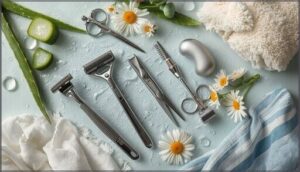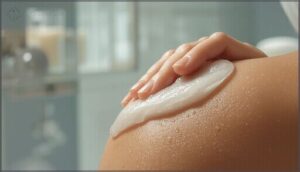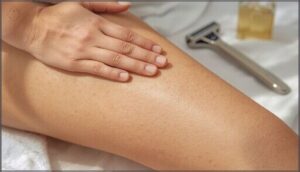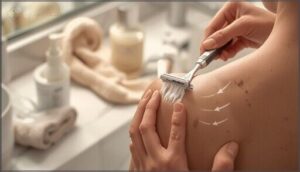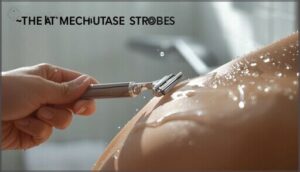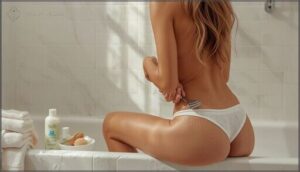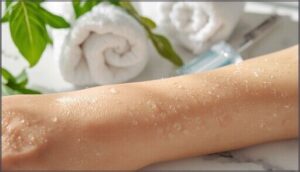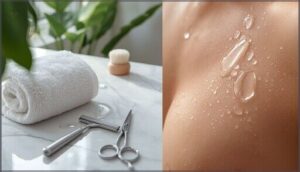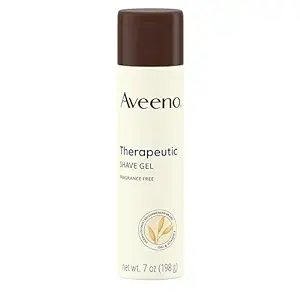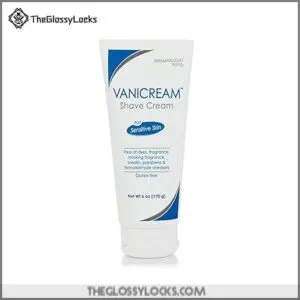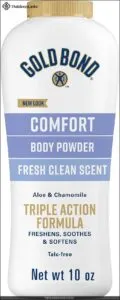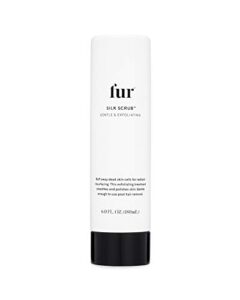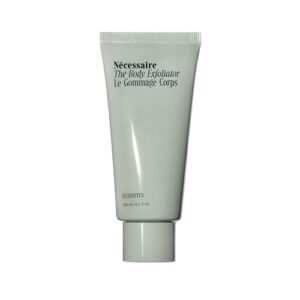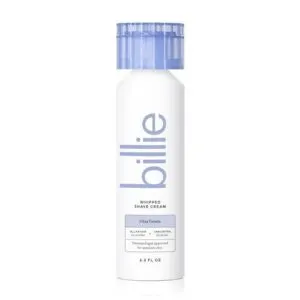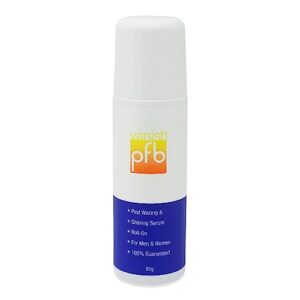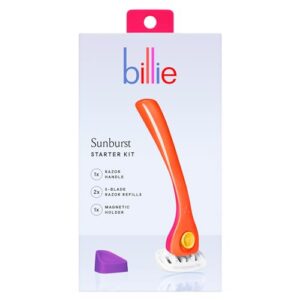This site is supported by our readers. We may earn a commission, at no cost to you, if you purchase through links.
Most people treat shaving their pubic area like any other grooming routine—until a rash, razor bump, or lingering sting reminds you that this skin plays by different rules. The truth is, pubic hair removal isn’t just about a smooth finish; it’s about protecting delicate skin from irritation and infection.
Whether you’re aiming for comfort, confidence, or intimacy, the right approach makes all the difference. With practical steps and smart product choices, you can sidestep common mistakes and keep your skin healthy. Ready to master the safest way to shave your pubic area? Let’s get started.
Table Of Contents
- Preparing Your Pubic Area for Shaving
- Choosing Safe Shaving Tools and Products
- Step-by-Step Shaving Process
- Shaving Techniques for Women
- Shaving Techniques for Men
- Post-Shave Skin Care Routine
- Preventing Ingrown Hairs and Irritation
- Common Mistakes to Avoid
- Health Risks and Safety Tips
- Top 8 Products for Pubic Hair Shaving
- Frequently Asked Questions (FAQs)
- How do you shave a man’s pubic hair?
- What are the ways to prevent pediculosis pubic?
- Why should you prepare your pubic area for a shave?
- What should you do before shaving your pubes?
- What should I use to protect my skin while shaving pubic hair?
- How can I reduce skin irritation after shaving my pubic area?
- Are there any health benefits to shaving your pubic hair?
- What are some pubic hair styles for guys?
- Is it normal for a man to shave his pubic hair?
- What is the best way to shave your pubic area?
- Conclusion
Preparing Your Pubic Area for Shaving
Getting ready to shave your pubic area takes a bit of care and planning. The right steps can make the process smoother and help you avoid irritation. Here’s what you’ll want to do before you start.
Trimming Hair to The Right Length
If you want to avoid irritation, trim pubic hair to a good length—about 4mm—with scissors, clippers, or a hair trimmer. Using trimmer guards helps you stay precise and safe. Most people prefer trimming over full removal for better health outcomes and comfort. Preparation benefits include fewer nicks and less razor burn. Many people choose to keep their pubic hair, as personal choice matters.
- Less irritation, more confidence
- Quick, easy, and safe
- Helps skin’s natural protection
Exfoliating The Skin Gently
Once you’ve trimmed, exfoliating the skin gently makes a big difference. A gentle scrub or soft washcloth lifts dead skin, lowers your risk of ingrown hairs, and helps your razor glide smoothly. Frequency matters—exfoliate once or twice a week, never daily, to avoid irritation.
For sensitive skin, method selection is key: skip harsh scrubs and stick with fragrance-free options. Exfoliation helps remove dead skin cells, preventing buildup.
Cleaning and Disinfecting Tools
After exfoliating, cleaning and disinfecting your shaving tools is a non-negotiable step for shaving safety. Soap and water remove debris, while 70% isopropyl alcohol disinfects effectively. Dry blades well—moisture breeds bacteria. Store razors in a dry spot, not the shower. Replace blades every 5–7 shaves to keep skin safe.
- Alcohol Concentration matters
- Cleaning Frequency is key
- Drying Methods prevent bacteria
- Storage Practices reduce risk
- Blade Replacement boosts safety
Softening Hair With Warm Water
Warm water softens coarse pubic hair and makes shaving easier. A two-to-three-minute shower at 90–110°F hydrates hair fibers, reducing the cutting force by about 65%. This hydration duration improves shaving performance and skin outcomes.
Water temperature matters—too hot strips protective oils and increases irritation. Risks assessment shows that proper softening minimizes nicks, razor burn, and the microtrauma linked to infection after shaving pubic hair.
Choosing Safe Shaving Tools and Products
The tools and products you choose make all the difference in preventing irritation and cuts. You don’t need anything fancy, but you do need items that won’t aggravate sensitive skin or cause infection.
Let’s look at what actually works and why it matters for your safety.
Selecting The Right Razor or Trimmer
Choosing between manual and electric razors matters for both comfort and safety. Manual razors cut closer to the skin but carry a higher risk of nicks, while electric trimmers and shavers leave slightly more length and reduce direct blade contact.
Consider these features when selecting shaving tools:
- Blade Material – Hypoallergenic or titanium-coated options lower irritation risk
- Head Design – Smaller, pivoting heads navigate curves more easily
- Waterproof Features – Shower-safe models allow use with lubricating gel
- Guard Options – Trimmer guards around 3 mm prevent accidental cuts
- Safety Considerations – Inspect for damage regularly to avoid infection
Importance of Sharp, Clean Blades
Sharp razor blades prevent skin irritation and cut cleanly without tugging, while dull blades increase friction and nicks. Laboratory tests found up to 4.9 million bacteria on used razor blades, highlighting infection risks from contaminated shaving tools.
Replace your razor every 5–7 shaves to maintain blade hygiene and reduce bacterial contamination. Rinse thoroughly after each use and store in a dry location away from humid bathroom conditions.
Using Fragrance-Free Shaving Cream
Fragranced shaving creams increase your risk of allergic contact dermatitis by 26% in the genital area, so always choose fragrance-free formulations for vulvar health. Look for products with soothing agents like aloe vera or chamomile—these reduce friction during shaving pubic hair steps without exposing sensitive skin to unnecessary allergens.
Product selection matters: fragrance-free shaving cream application protects thin genital tissue while maintaining effective shaving techniques.
Step-by-Step Shaving Process
Once you’ve prepared your skin and gathered your tools, it’s time to actually shave. The technique you use matters just as much as the products you choose.
Here’s how to shave your pubic area safely, step by step.
Applying Shaving Cream or Gel
Think of shaving cream as your skin’s protective shield—without it, you’re shaving pubic hair with nothing between blade and skin.
Apply a thick layer of fragrance-free shaving gel or cream evenly across the area you’ll shave. Avoid products with alcohols, sulfates, or synthetic fragrances—these harmful ingredients strip moisture and trigger irritation.
Proper application thickness and product selection matter: lubrication importance can’t be overstated for preventing razor burn.
Stretching Skin for a Smooth Shave
Your free hand does real work here—pull the skin taut as you glide the razor. Stretching flattens folds and wrinkles, which reduces nicks by up to 84% when shaving pubic hair.
This injury prevention technique improves smoothness and aids epidermal preservation by minimizing blade drag. Shaving techniques for women and men both benefit: taut skin aligns follicles, lessening irritation and ingrown hairs considerably.
Shaving in The Direction of Hair Growth
You’ll slash ingrown hairs and razor burn by shaving in the direction of hair growth—not against it. Your pubic hair often grows in multiple directions, so map the pattern first before you start:
- Observe natural growth in each zone of your genital area
- Glide the razor with the grain to prevent follicle tugging
- Avoid upward strokes on the bikini line where hair curves downward
- Use shorter passes where growth changes direction abruptly
- Shave sections separately rather than one continuous motion
Shaving with the grain reduces friction, preventing irritation and lowering infection risks from nicks. Hair structure matters—coarse, curly pubic hair re-enters skin more easily when cut too close against its natural curl pattern, so following hair growth direction protects you.
Using Short, Gentle Strokes
Short, controlled strokes give you precision and safety when shaving pubic hair. Take passes no longer than one inch—this lets you adjust blade angle around curves and inguinal folds without catching skin.
Rinse your razor every two to three strokes to prevent clogging. Light stroke pressure reduces friction and nicks, especially when you’re stretching skin over the vulva or scrotum.
Shaving Techniques for Women
Shaving the pubic area as a woman requires extra care because the skin around the vulva and bikini line is thinner and more sensitive than other parts of your body. You’ll need to navigate curves, folds, and areas where the skin moves easily, which means your technique matters more than you might think.
Let’s walk through how to shave these areas safely while minimizing irritation and cuts.
Navigating The Bikini Line and Vulva
When shaping your bikini line or shaving the vulva, pay close attention to Vulvar Skin Sensitivity and the natural Bikini Line Shape. The skin here is delicate, and shaving pubic hair too aggressively can cause Shaving Complications, including Vulvar Dysplasia Risk.
For Ingrown Hair Prevention, always shave the bikini area gently, following hair growth, and use products designed for safe pubic hair shaving.
Avoiding Sensitive Areas and Cuts
If you’re working along the bikini line, keeping skin taut and using a sharp blade are your best defenses against cuts. Shave with the grain, not against it, to protect sensitive skin. Lubrication matters—fragrance-free cream helps the razor glide. Reducing frequency lets skin recover, lowering irritation risk.
- Stretch skin gently for safer shaving
- Prioritize blade sharpness
- Use lubrication for comfort
Managing Coarse or Curly Hair
Now, if your hair is coarse or curly, you’re more likely to battle ingrown hairs and even ingrown hair cysts. To help, trim to about 4 mm, use a single-blade razor, and shave in the direction of growth. Gentle exfoliation methods keep follicles clear.
For stubborn bumps, consider laser removal. Lubricate well with shaving cream or gel to prevent razor burn.
Shaving Techniques for Men
Shaving the pubic area can be tricky for men, especially when dealing with sensitive skin and hard-to-reach spots. You’ll want to use careful techniques to avoid irritation and accidental cuts.
Here are some key tips to help you shave safely and comfortably.
Shaving The Scrotum Safely
Did you know the scrotum is the most commonly injured spot during pubic grooming? You can lower injury risks by keeping skin stretching steady, using a sharp razor, and applying fragrance-free shaving cream. Gentle shaving techniques for men help prevent skin irritation and infection risks. For best post-shave care, rinse well and moisturize.
- Always stretch skin gently
- Use fresh, sharp blades
- Apply soothing shaving cream
- Moisturize after every shave
Handling Difficult-to-Reach Areas
Ever wondered why body positioning matters so much for shaving the genital area? Raising your knee or using a small mirror lets you see tricky spots better.
Razor choice also counts—small heads help with precision. Stretching skin keeps surfaces smooth, while blade maintenance lowers risks.
These shaving techniques for men make handling difficult areas safer, even around the bikini area.
Preventing Nicks and Razor Burn
Because dull blades tug on hair, blade sharpness directly affects your risk of nicks. Shaving direction also matters—always go with the grain. Proper lubrication with shaving cream reduces friction, while skin stretching creates a smooth surface.
Consider these steps for preventing razor burn:
- Replace blades every 5–7 shaves
- Apply aloe vera or fragrance-free aftershave immediately after
- Reduce frequency reduction to let skin recover
- Rinse with cool water to close pores
Post-Shave Skin Care Routine
What you do after shaving matters just as much as the shave itself. Your skin is more vulnerable right now, so you need to treat it gently to avoid irritation, bumps, or infection.
Let’s walk through the essential steps to keep your skin calm and healthy.
Rinsing and Patting Skin Dry
Did you know a cool water rinse after shaving acts like a reset button for your skin? It calms irritation and helps with moisture control.
Next, use gentle pat drying—never rub—so you don’t risk micro-cuts. Towel hygiene matters; reach for a clean, soft towel every time.
Timing sequence is key: rinse, pat dry, then move to aftercare.
Applying Fragrance-Free Moisturizer
Think of moisturizer as a safety net for your freshly shaved skin. Fragrance-free formulas, especially those with ceramides or hyaluronic acid, boost skin hydration and barrier repair—just what sensitive skin needs after shaving.
Moisturizing the skin right away helps calm irritation. Fragrance avoidance lowers your risk of redness or allergic reactions, keeping your skin care after shaving simple and safe.
Avoiding Tight Clothing After Shaving
Freshly shaved skin is like a blank canvas—fragile and easily irritated. Wearing tight clothing right after shaving traps moisture, increases friction, and raises your risk of irritation or even vulvodynia.
For postshave care, opt for loose, cotton underwear. Breathable fabrics help with moisture control and friction reduction, making cotton skivvies the best choice for preventing skin irritation in sensitive areas.
Preventing Ingrown Hairs and Irritation
Keeping your skin smooth after shaving isn’t just about the shave itself. Ingrown hairs and irritation can sneak up if you’re not careful.
Here are some simple ways to help your skin stay healthy and comfortable.
Regular Exfoliation After Shaving
Regular exfoliation, about two times per week, is key for ingrown hair prevention after shaving. Gentle mechanical methods—like a soft cloth—work well, while chemical exfoliants such as glycolic or salicylic acid help clear follicles.
Always follow with post-exfoliation care using fragrance-free moisturizers. This routine reduces skin irritation and keeps your postshave care smooth and healthy.
Avoiding Over-Shaving and Repeated Passes
Once you’ve got exfoliation down, it’s time to focus on shaving technique. Minimize strokes—each extra pass can increase skin disruption and razor burn.
For instance, repeated shaving over the same spot raises your risk of irritation and microtrauma. Give your skin enough recovery time between sessions. Gentle, single-direction strokes help prevent irritation and keep your pubic area healthier.
Using Single-Blade Razors for Sensitive Skin
If you’re aiming for less irritation, switching to a single-blade razor can make a real difference. Blade angle control helps you target hair without tugging, and friction reduction means fewer bumps. There’s a learning curve, but benefits stack up:
- Lower risk of infection from microcuts
- Smoother shave for sensitive skin
- Gentler product formulation for delicate areas
Common Mistakes to Avoid
Even with the best intentions, it’s easy to slip up when shaving your pubic area. A few common mistakes can lead to irritation, bumps, or discomfort.
Here’s what you’ll want to watch out for.
Shaving Against The Grain
Shaving against the grain is a shortcut to razor burn and increased irritation. When you shave this way, you boost your risk of ingrown hairs and folliculitis—especially in areas with coarse, curly hair.
Skin damage happens fast, with bumps and redness appearing within days. Always shave in the direction of hair growth for preventing irritation and keeping skin healthy.
Using Dull or Dirty Razors
Even if you’re careful, using a dull or dirty razor can turn a simple shave into a recipe for infection risk and skin irritation. Blunt blades tug at hair, causing razor burn and microtears.
Dirty razors, especially those with trapped debris, invite bacteria—think MRSA outbreaks. Prioritizing blade sharpness and strict hygiene practices protects your skin and health every single time.
Not Exfoliating Before or After Shaving
When you skip exfoliating before shaving, you set yourself up for Ingrown Hairs, Razor Burn, and Skin Infections. Dead skin clogs follicles, dulls razors, and leaves you with patchy results.
Regular skin exfoliation improves Shaving Effectiveness and reduces Post-Shave Discomfort. For smoother aftergrooming care, exfoliate before and—gently—after shaving, but don’t overdo it.
Health Risks and Safety Tips
Shaving your pubic area comes with a few health risks you should know about. Staying safe means understanding what can go wrong and how to spot trouble early.
Here’s what to keep in mind before you pick up the razor.
Risks of Skin Infection and Irritation
Did you know nearly 60% of people who shave their pubic area report skin irritation or complications? Bacterial infections, viral infections, and painful ingrown hairs often follow close shaving. Emergency treatment is sometimes needed for cuts or abscesses.
Nearly 60% of people who shave their pubic area experience irritation or complications, including infections and painful ingrown hairs
That’s why avoiding skin irritation, treating razor burn quickly, and choosing safe methods are key for preventing skin conditions and risks of shaving.
Increased STI Risk With Frequent Shaving
Did you know frequent pubic hair removal can quietly raise your risk for STIs? Shaving creates microscopic skin tears, making it easier for viruses and bacteria to enter. If your sexual activity levels are high, these tiny injuries matter even more.
Grooming frequency impacts STI transmission mechanisms, but confounding factors like hygiene and safe sex practices also play a big role in prevention.
Signs You Should See a Doctor
Persistent symptoms after shaving aren’t just a nuisance—they can signal deeper trouble. If you notice any of these, don’t wait to seek professional help or dermatological advice:
- Skin infection: pus, foul odor, or spreading redness
- Severe reactions: blistering, burns, or bleeding
- Systemic symptoms: fever, nausea, or pain with urination
- Recurrent complications: chronic ingrown hairs or abscesses
Top 8 Products for Pubic Hair Shaving
Choosing the right products can make all the difference when shaving your pubic area. You want options that help protect your skin and keep things comfortable.
Here are eight top picks for your grooming routine.
1. Aveeno Therapeutic Shave Gel For Women
Looking for a shave gel that treats your skin as gently as you do? Aveeno Therapeutic Shave Gel for Women is a top pick for sensitive skin, especially when shaving the bikini area.
Its formula—packed with colloidal oatmeal, vitamin E, and aloe—soothes and hydrates, helping to prevent razor burn and bumps. Oatmeal benefits aren’t just hype; clinical research shows low irritation and lasting moisture.
Ingredient safety is strong, and market analysis confirms this shaving cream leads in sensitive skin care.
Best For: Women with sensitive, dry, or easily irritated skin who want a gentle shave gel for areas like the bikini line.
- Soothes and moisturizes with colloidal oatmeal, vitamin E, and aloe
- Helps prevent razor bumps, burn, and nicks with a lubricating, fragrance-free formula
- Dermatologist-recommended and allergy tested for sensitive skin
- Some users notice a slight scent despite “fragrance-free” labeling
- Packaging can sometimes leak during shipping
- May not suit everyone’s texture or consistency preferences
2. Vanicream Sensitive Skin Shave Cream
If you need a fragrance-free formula that’s gentle enough for sensitive skin, Vanicream Sensitive Skin Shave Cream stands out. Dermatologist tested and widely recommended, this shaving cream leaves a protective barrier for smoother shaving outcomes.
User reviews mention it’s ideal for those with allergies or irritation, and you only need a small amount for each shave. The non-lathering texture might feel different at first, but it helps your razor glide without harsh chemicals.
That’s practical comfort for anyone seeking safe, effective pubic care.
Best For: People with sensitive skin or allergies who want a fragrance-free, gentle shave.
- Free of fragrances, dyes, parabens, and sulfates for minimal irritation
- Dermatologist tested and recommended for sensitive skin
- Only a small amount needed per shave, making the tube last longer
- Some users find the scent unpleasant despite being fragrance-free
- Non-lathering texture may feel odd or uncomfortable to some
- Can be hard to rinse off, sometimes leaving a tacky residue
3. Gold Bond Comfort Body Powder Fresh
After you’ve applied a gentle moisturizer, some people reach for Gold Bond Comfort Body Powder Fresh for added moisture control and friction reduction. Its talc-free formula uses cornstarch, aloe, and chamomile to help soothe skin, but remember—this powder is scented.
If you’re sensitive to fragrance or just shaved, wait until your skin is calm before using. For post-shave use, pat onto dry, intact skin around the pubic area—not directly on irritated spots—to keep things feeling fresh and comfortable.
Best For: People looking for a talc-free body powder to help control moisture and reduce friction on dry, intact skin after shaving.
- Soothes and softens skin with aloe, chamomile, and added vitamins.
- Absorbs moisture and helps prevent chafing throughout the day.
- Fresh clean scent leaves skin feeling comfortable and refreshed.
- No safety or sanitary seal on the bottle.
- Scented formula may irritate sensitive or freshly shaved skin.
- Can be gritty and messy if too much is applied.
4. Fur Silk Scrub KP Eraser
If you’re aiming for smooth, bump-free skin, Fur Silk Scrub KP Eraser is worth your attention. This exfoliating scrub blends AHA exfoliation with eco-friendly Jojoba Beads, making it gentle enough for sensitive areas like the pubic region.
It helps exfoliate dead skin, unclog follicles, and boost skin hydration—all key for ingrown prevention. Many find it effective for keeping ingrown hairs at bay, though some say it’s pricey or tricky to dispense. Use two to three times weekly for best results.
Best For: People dealing with ingrown hairs, razor bumps, or rough skin in sensitive areas who want a gentle but effective exfoliating scrub.
- Dermatologist and gynecologist approved for use on sensitive zones
- Combines chemical and physical exfoliation to smooth and hydrate skin
- Vegan, clean formula with eco-friendly jojoba beads and natural enzymes
- Some users find it expensive compared to similar scrubs
- Bottle can clog, making it hard to get the product out
- May cause dryness or irritation if overused, especially on sensitive skin
5. Nécessaire The Body Exfoliator Eucalyptus
If you’re searching for a gentle way to exfoliate before or after shaving, Nécessaire The Body Exfoliator Eucalyptus stands out. This exfoliating scrub combines AHA/BHA exfoliation with volcanic pumice, making it suitable for sensitive skin and those prone to ingrown hairs.
You’ll notice smoother skin texture and fewer bumps, especially when used once or twice weekly. Its gel formula foams lightly and leaves skin soft, with a fresh eucalyptus scent—a sensory attribute many find invigorating in their skin care routine.
Best For: People with sensitive or bumpy skin who want a gentle, effective exfoliator to help with ingrown hairs and improve texture before or after shaving.
- Combines chemical and physical exfoliation for smooth, soft skin.
- Hypoallergenic, vegan, and cruelty-free formula is suitable for sensitive skin.
- Fresh eucalyptus scent adds a spa-like touch to your routine.
- Pricey compared to other body scrubs.
- Runny gel texture can be messy to use.
- Not recommended for daily use; best limited to once or twice a week.
6. Billie Ultra Gentle Shave Cream
A standout in gentle formulation, Billie Ultra Gentle Shave Cream is designed for sensitive skin and delicate pubic hair removal methods. Ingredient analysis shows a blend of coconut oil, shea butter, aloe, and allantoin—each soothing and protecting your skin during the shave.
The whipped texture creates a cushioning barrier, reducing nicks and irritation. User experience is consistently positive, with many appreciating its fragrance-free, dermatologist-approved formula.
Billie’s market position makes this shaving cream a reliable choice for those prioritizing safety and comfort among shaving products.
Best For: Anyone with sensitive skin or those looking for a gentle, fragrance-free shave—especially on delicate areas like the bikini line.
- Ultra-gentle, fragrance-free formula helps prevent irritation and razor burn
- Whipped texture creates a protective barrier for smoother shaving
- Vegan, cruelty-free, and free from sulfates and parabens
- Doesn’t produce a bubbly lather, which some users may miss
- Costs more than typical drugstore shaving creams
- Patch testing is recommended for extra sensitive skin
7. PFB Vanish Razor Bump Treatment Gel
One product worth considering for aftershave care is PFB Vanish Razor Bump Treatment Gel. Its active ingredients—salicylic acid, glycolic acid, and willow bark—work together to tackle ingrown hairs and prevent skin irritation, especially in the bikini area.
For best results, apply it right after shaving; let it dry before layering other products. User reviews mention a strong smell and possible stinging, so patch test if you’re sensitive.
Safety concerns include avoiding mucosal areas and using sunscreen if treating hyperpigmentation.
Best For: People who regularly shave or wax sensitive areas like the bikini line and want to prevent razor bumps and ingrown hairs.
- Easy roll-on gel for quick, targeted application
- Effective at reducing ingrown hairs and smoothing skin tone
- Works on multiple body areas, including the bikini line and underarms
- Strong smell and possible stinging, especially on sensitive skin
- Can feel sticky after use
- Pricey for the amount of product you get
8. Billie Razors for Women Shave Kit
The Billie Razors for Women Shave Kit brings together sharp Blade Technology and thoughtful Ergonomic Design, making hair removal safer and more comfortable. Each kit includes a non-slip handle, two five-blade cartridges, and a magnetic holder—practical Kit Components for your shower routine.
User Reviews highlight its gentle glide and reduced irritation, especially when paired with Billie’s shaving cream.
Positioned near the top of the women’s razor market, Billie’s nickel-free blades and aloe strip help protect sensitive skin during every shave.
Best For: Women looking for a gentle, easy-to-use razor that works well on sensitive skin and offers convenient storage.
- Nickel-free blades and aloe strip help reduce irritation, even for sensitive skin
- Non-slip ergonomic handle and pivoting head make shaving comfortable and easy
- Magnetic holder keeps the razor dry and accessible in the shower
- Some users report the shave isn’t as close as they’d like, especially with the thick moisture strip
- Handle can get slippery when wet despite its non-slip design
- Durability issues, with a few users saying the razor falls apart quicker than expected
Frequently Asked Questions (FAQs)
How do you shave a man’s pubic hair?
Let’s cut to the chase—when shaving a man’s pubic hair, trim first, use shaving cream, and a sharp razor.
Stretch skin for scrotum shaving, use short strokes for shaft shaving, and focus on hygiene practices for ingrown prevention.
What are the ways to prevent pediculosis pubic?
To prevent pediculosis pubic, avoid infested contact, decontaminate personal items, and screen partners. Good personal hygiene and safe grooming practices are essential.
Understanding condom limitations and incorporating regular hygiene practices and STI prevention measures into personal grooming routines are key.
Why should you prepare your pubic area for a shave?
Skipping preparation is like racing through a thorny path—your skin pays the price.
When you exfoliate and trim pubic hair, you reduce irritation, prevent infections, and gain hygiene benefits, smoother shave results, and better ingrown prevention.
What should you do before shaving your pubes?
Before shaving your pubic area, trim pubic hair to less than 1/4 inch, gently exfoliate your skin, disinfect all tools, and soak the area in warm water.
These steps lower infection risk and help prevent irritation.
What should I use to protect my skin while shaving pubic hair?
To protect your skin, use lubricating products like fragrance-free shaving cream, gel, or foam with softeners and emollients.
Choose shaving products with aloe vera or antibacterial properties, and avoid harsh soaps, scented formulas, or dry shaving practices.
How can I reduce skin irritation after shaving my pubic area?
To calm skin sensitivity, use cool compresses and a fragrance-free moisturizer or aloe vera for barrier repair.
Try gentle exfoliation to help with ingrown hairs.
If redness won’t fade, hydrocortisone cream and loose clothing can help soothe irritation.
Are there any health benefits to shaving your pubic hair?
Like sweeping dust from a rug, removing pubic hair may lower lice risk and help some feel cleaner, but it doesn’t improve hygiene or vaginal health.
In fact, frequent hair removal can disrupt your skin microenvironment and increase STI risks.
What are some pubic hair styles for guys?
Guys often choose trimmed styles for a neat look, full removal for smoothness, or shaped designs for creativity. Some prefer a natural look with minimal trimming.
Grooming frequency and pubic hair grooming methods—like using a trimmer—vary by comfort.
Is it normal for a man to shave his pubic hair?
Yes, it’s normal for men to shave pubic hair. Grooming prevalence is high—over half of U.S. men do it regularly.
Social acceptance and partner preferences often drive personal grooming, with hygiene perceptions and genital satisfaction playing important roles.
What is the best way to shave your pubic area?
Here’s a paradox: the best techniques for shaving pubic hair are gentle, not aggressive. Use a sharp razor, fragrance-free shaving cream, and shave with the grain.
Product comparison matters—choose tools for your hair type to minimize pain and long-term effects.
Conclusion
It’s no accident that comfort and confidence show up together when you follow the safest way to shave your pubic area. Each careful step—trimming, exfoliating, and choosing the right products—works like pieces of a puzzle, fitting together to protect your skin.
You’re not just removing hair; you’re building a routine that respects your body’s boundaries. With knowledge and attention, you can trade worry for ease, knowing every shave is a conscious choice for health and care.
- https://www.renalandurologynews.com/news/pubic-hair-removal-may-up-risk-of-stis/
- https://irsa.clinic/en/can-pubic-hair-removal-cause-sexually-transmitted-infections/
- https://www.medicalnewstoday.com/articles/how-can-people-treat-razor-bumps-in-the-genital-area
- https://www.monistat.com/vaginal-health-blog-articles/identifying-razor-burn-vs-razor-bumps-and-how-to-treat-both
- https://my.clevelandclinic.org/health/diseases/ingrown-pubic-hair


